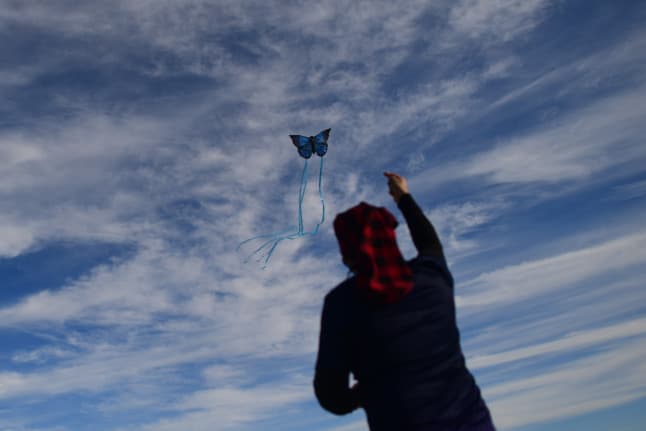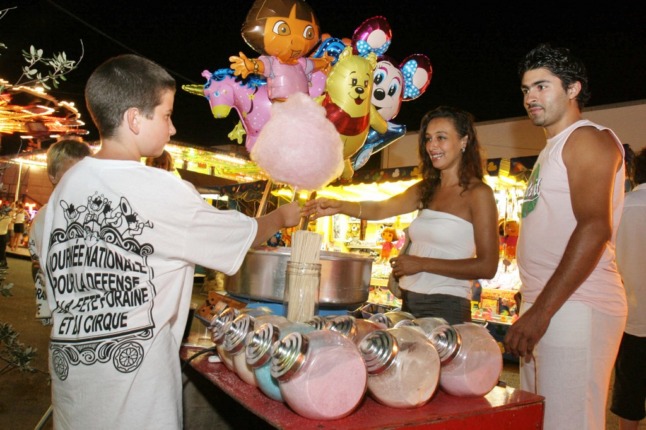10 everyday terms that are more poetic in French

Why create a new word when you can use several existing words? From flying deer to licking windows, these are some of the common terms that just sound better in French.
Papillon de nuit - moth. If you had never come across one before, and had to pick between seeing a "moth", or a "night butterfly", it'd probably be a simple choice for most people. Instead of an annoying insect that keeps banging into the light bulb, papillon de nuit makes you think of a butterfly in evening clothes. Language has a lot of power to shape how we see the world, and maybe more insects would benefit from being compared to something more popular.
A la belle étoile - outdoors. This phrase is often used to describe a camping trip, where you might dormir à la belle étoile - sleep under the stars. But because the French have to be extra romantic, they go one further and describe sleeping "under the beautiful star".

French singer Vanessa Paradis has the 'teeth of happiness'. Photo by Loic VENANCE / AFP
Les dents du bonheur - diastema. The term avoir les dents du bonheur literally means "to have the teeth of happiness", but it's how people in France describe someone who has a gap between their two front teeth.
The phrase dates back to the Napoleonic wars, when such people were exempted from service. To load their heavy rifles, soldiers needing to hold their weapon with two hands, and open the cartridge's paper packaging with their teeth. Since this was believed to be too difficult for people with a gap between their teeth, they avoided being sent to the front lines, thus their smiles became a synonym for luck and happiness.
Cerf-volant - kite. That's right, a kite in French is a "flying deer". The most popular theory posits that the term evolved from serp-volante, with serpe a former regional term for serpent (snake), since the first kites are believed to have resembled flying snakes, or dragons. So it has nothing to do with deer, but don't let that stop you from imagining a soaring deer next time you see a child flying a kite.
Lèche-vitrines - window shopping. You can tell how badly the French need their fashion fix. While in English we talk about going window shopping, the French equivalent is faire du lèche-vitrines - do some window-licking. It may not be the most flattering image, but we feel it captures the longing many of us feel when staring at objects we can't afford.
Grain de beauté - mole. Literally a "grain of beauty", this term is of course similar to the English "beauty mark". But most French people who aren't doctors will make no distinction between a mole and a beauty mark - they are all grains de beauté in French, regardless of where they appear on the body.

Buy some lovely 'dad's beard' on a trip to the circus. Photo by ERIC ESTRADE / AFP
Barbe à papa - candy floss / cotton candy. Is there any other sweet treat that is so comforting to a child?
It's like eating a cloud, or a delicious blanket. It's even more comforting in France, though, where it's referred to as "dad's beard". While we haven't come across many fathers with pink or blue facial hair, we must admit there is a Father Christmas element to the texture, and the imaginative phrase will transport you to memories of your older relatives and make you forget the damage you're doing to your teeth.
Œil au beurre noir - black eye. It's not just that food products are compared to body parts in French - the opposite is also true.
The French term for a shiner is "eye with black butter". The original expression was slightly longer - œil poché au beurre noir - meaning an "eye poached in black butter', because the term draws a visual comparison to œufs pochés au beurre noir - poached eggs cooked in butter that's heated until it turns a dark colour. In this case the pupil becomes the egg yoke. Even in moments of extreme pain, the French have their grandmother's cooking on the mind.
Pomme de terre - potato. Some terms are so ubiquitous we use them every day and can end up forgetting the literal meaning. But when you stop and think about it, "earth apple" is a pretty good way to describe a potato.
Gueule de bois - hangover. Have you ever thought that the word "hangover" just isn't evocative enough of the despair you feel the morning after having had too much to drink? French has you covered.
Avoir la gueule de bois literally means "to have a wooden mouth", and describes the dry mouth you get when you're dehydrated from having consumed too much alcohol. But it has also come to describe all the symptoms of a hangover. Unfortunately the film The Hangover was released as Very Bad Trip in France, which doesn't sound quite as impressive.
Comments
See Also
Papillon de nuit - moth. If you had never come across one before, and had to pick between seeing a "moth", or a "night butterfly", it'd probably be a simple choice for most people. Instead of an annoying insect that keeps banging into the light bulb, papillon de nuit makes you think of a butterfly in evening clothes. Language has a lot of power to shape how we see the world, and maybe more insects would benefit from being compared to something more popular.
A la belle étoile - outdoors. This phrase is often used to describe a camping trip, where you might dormir à la belle étoile - sleep under the stars. But because the French have to be extra romantic, they go one further and describe sleeping "under the beautiful star".

Les dents du bonheur - diastema. The term avoir les dents du bonheur literally means "to have the teeth of happiness", but it's how people in France describe someone who has a gap between their two front teeth.
The phrase dates back to the Napoleonic wars, when such people were exempted from service. To load their heavy rifles, soldiers needing to hold their weapon with two hands, and open the cartridge's paper packaging with their teeth. Since this was believed to be too difficult for people with a gap between their teeth, they avoided being sent to the front lines, thus their smiles became a synonym for luck and happiness.
Cerf-volant - kite. That's right, a kite in French is a "flying deer". The most popular theory posits that the term evolved from serp-volante, with serpe a former regional term for serpent (snake), since the first kites are believed to have resembled flying snakes, or dragons. So it has nothing to do with deer, but don't let that stop you from imagining a soaring deer next time you see a child flying a kite.
Lèche-vitrines - window shopping. You can tell how badly the French need their fashion fix. While in English we talk about going window shopping, the French equivalent is faire du lèche-vitrines - do some window-licking. It may not be the most flattering image, but we feel it captures the longing many of us feel when staring at objects we can't afford.
Grain de beauté - mole. Literally a "grain of beauty", this term is of course similar to the English "beauty mark". But most French people who aren't doctors will make no distinction between a mole and a beauty mark - they are all grains de beauté in French, regardless of where they appear on the body.

Barbe à papa - candy floss / cotton candy. Is there any other sweet treat that is so comforting to a child?
It's like eating a cloud, or a delicious blanket. It's even more comforting in France, though, where it's referred to as "dad's beard". While we haven't come across many fathers with pink or blue facial hair, we must admit there is a Father Christmas element to the texture, and the imaginative phrase will transport you to memories of your older relatives and make you forget the damage you're doing to your teeth.
Œil au beurre noir - black eye. It's not just that food products are compared to body parts in French - the opposite is also true.
The French term for a shiner is "eye with black butter". The original expression was slightly longer - œil poché au beurre noir - meaning an "eye poached in black butter', because the term draws a visual comparison to œufs pochés au beurre noir - poached eggs cooked in butter that's heated until it turns a dark colour. In this case the pupil becomes the egg yoke. Even in moments of extreme pain, the French have their grandmother's cooking on the mind.
Pomme de terre - potato. Some terms are so ubiquitous we use them every day and can end up forgetting the literal meaning. But when you stop and think about it, "earth apple" is a pretty good way to describe a potato.
Gueule de bois - hangover. Have you ever thought that the word "hangover" just isn't evocative enough of the despair you feel the morning after having had too much to drink? French has you covered.
Avoir la gueule de bois literally means "to have a wooden mouth", and describes the dry mouth you get when you're dehydrated from having consumed too much alcohol. But it has also come to describe all the symptoms of a hangover. Unfortunately the film The Hangover was released as Very Bad Trip in France, which doesn't sound quite as impressive.
Join the conversation in our comments section below. Share your own views and experience and if you have a question or suggestion for our journalists then email us at [email protected].
Please keep comments civil, constructive and on topic – and make sure to read our terms of use before getting involved.
Please log in here to leave a comment.